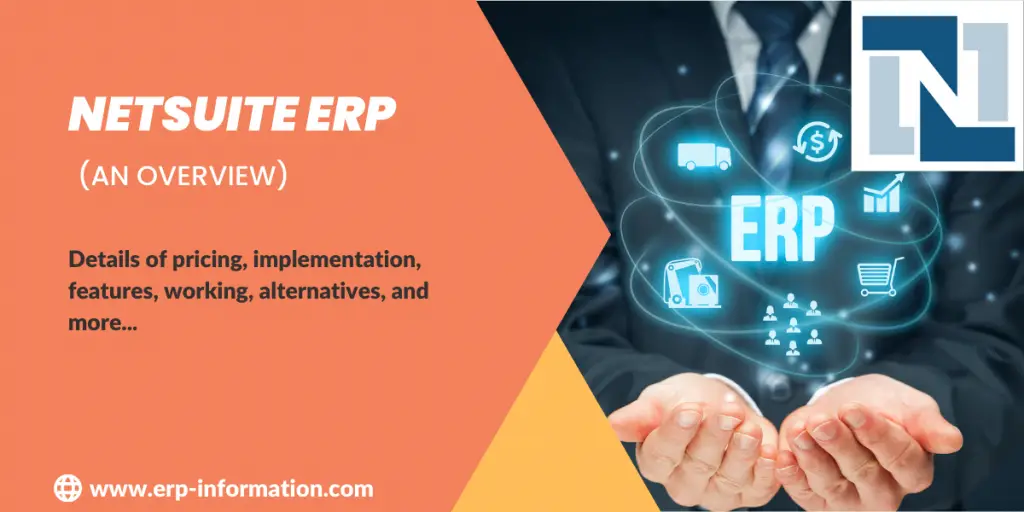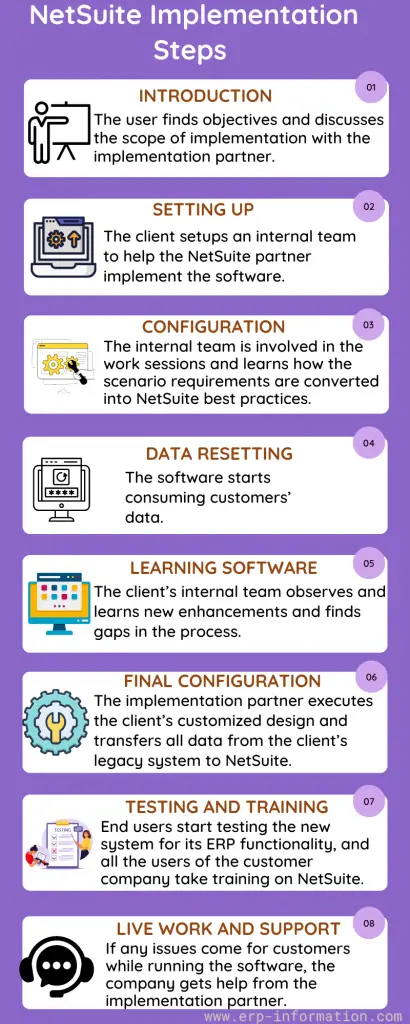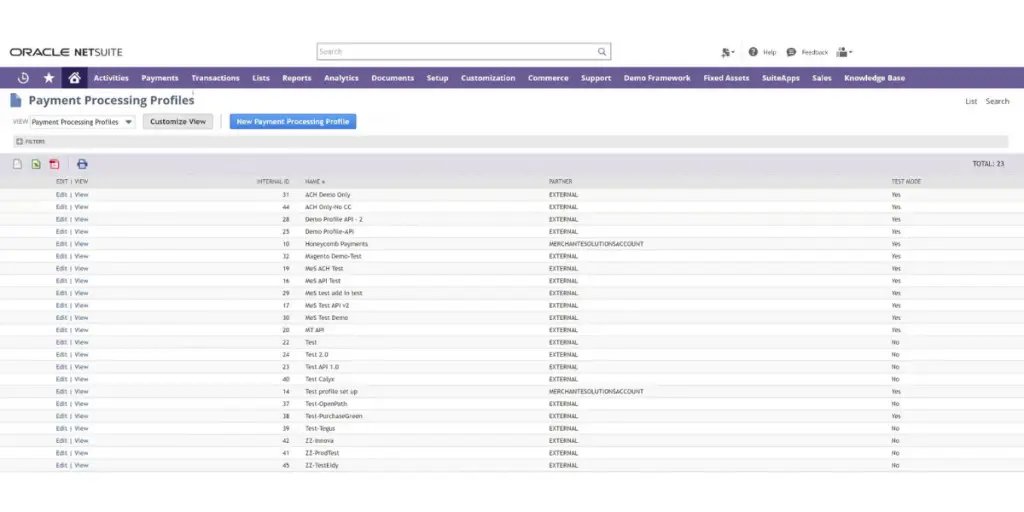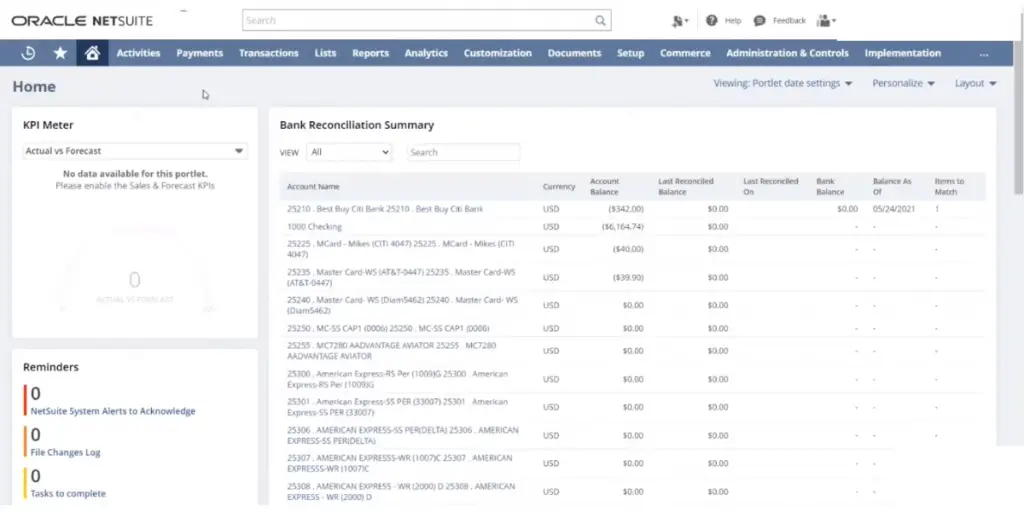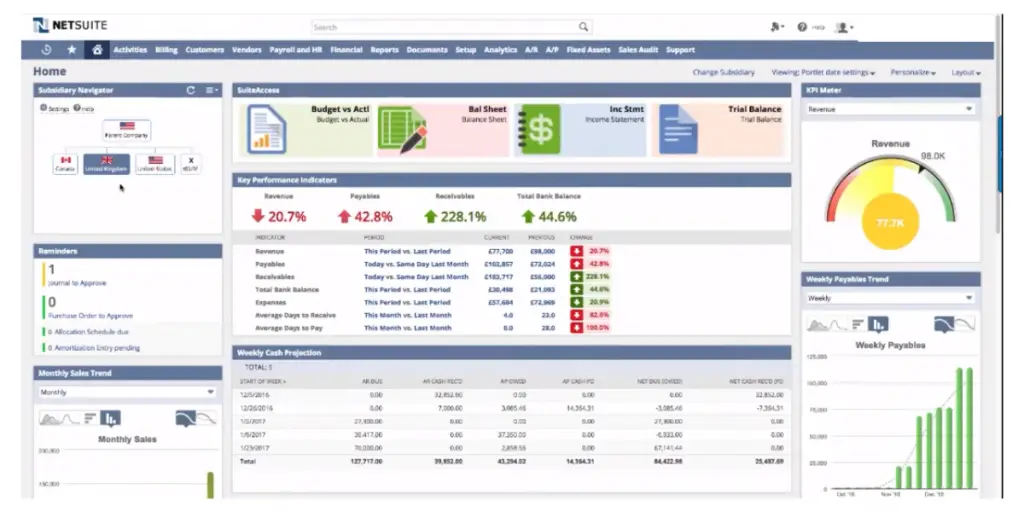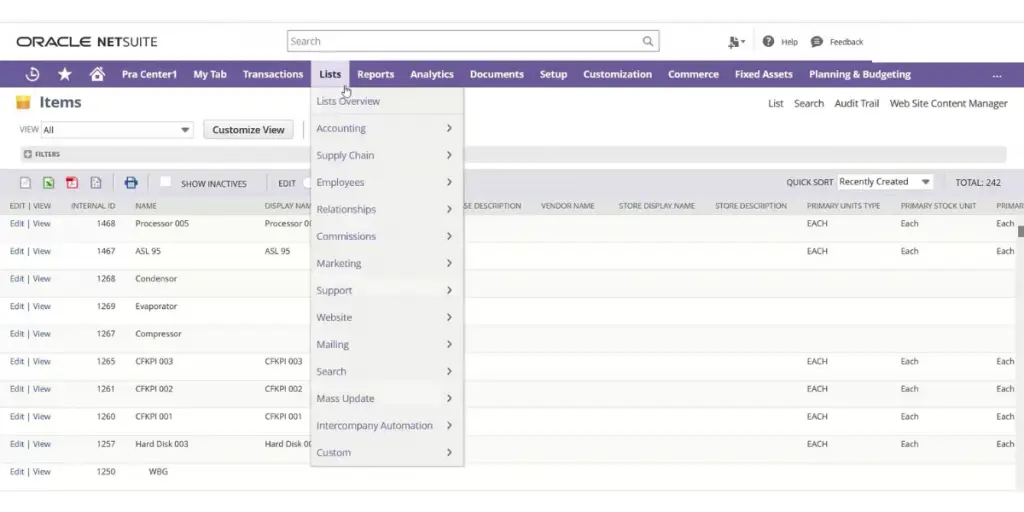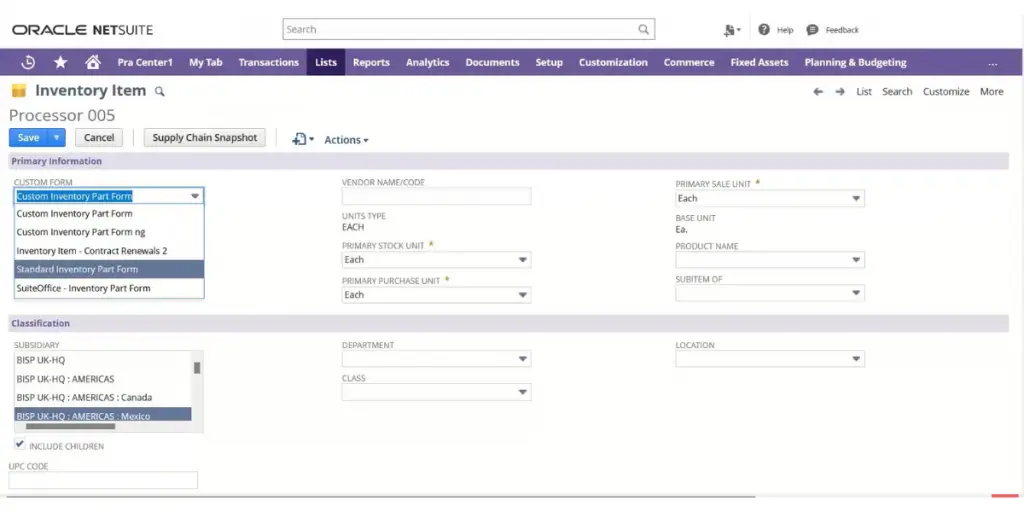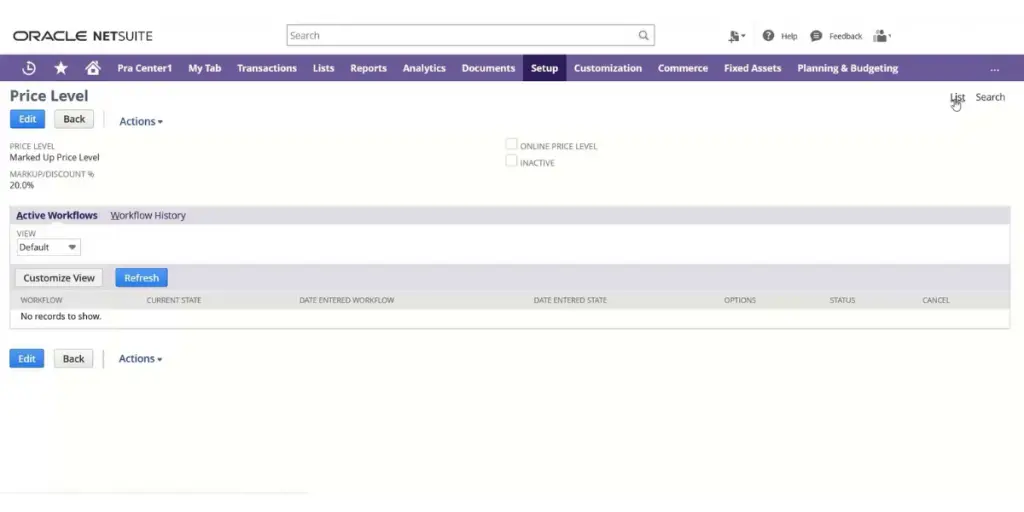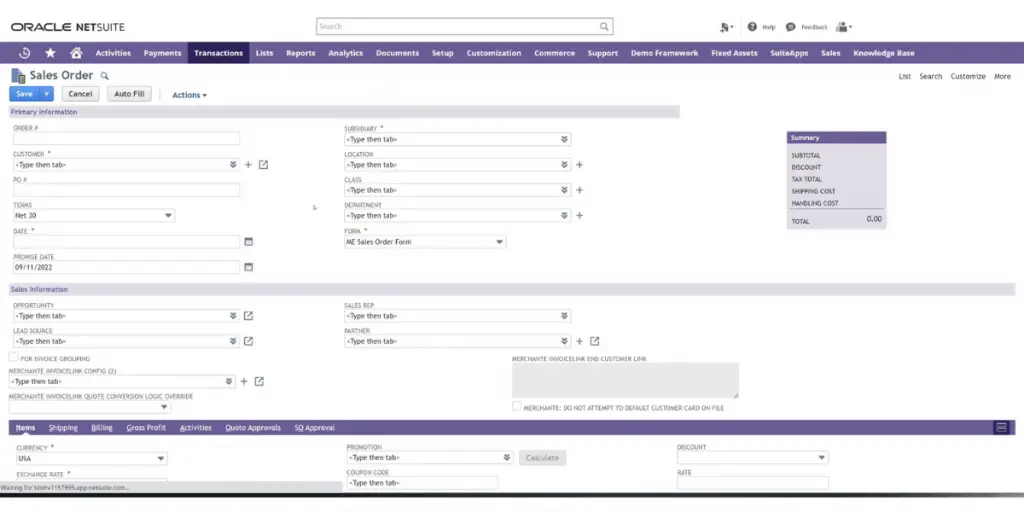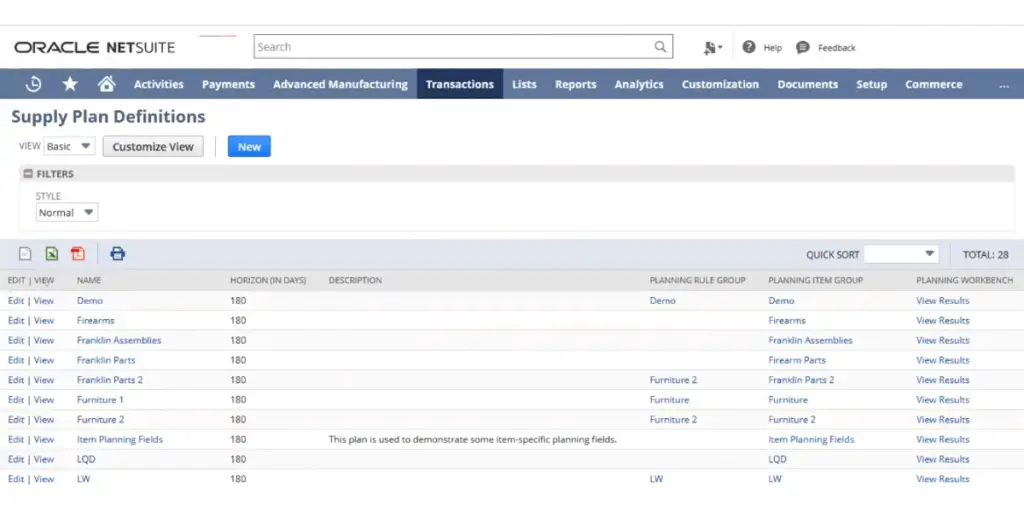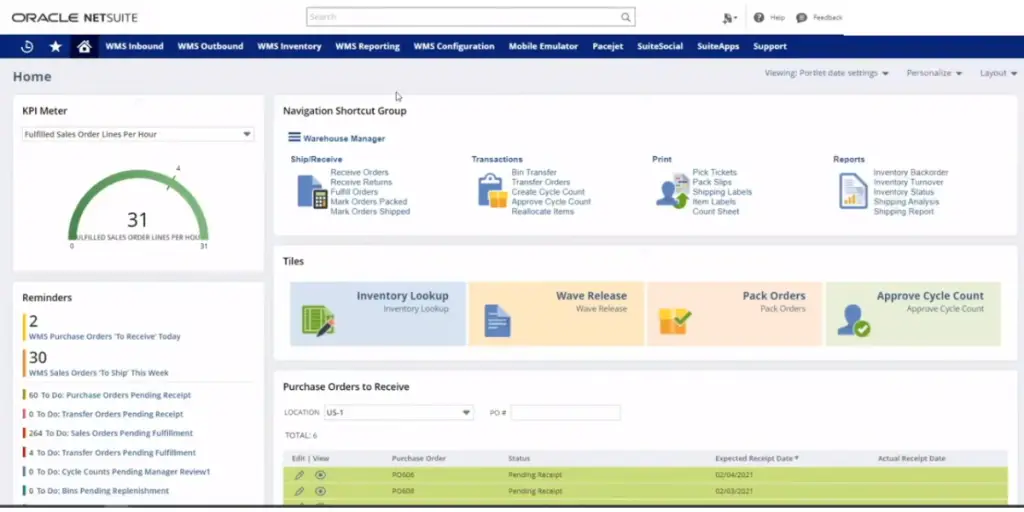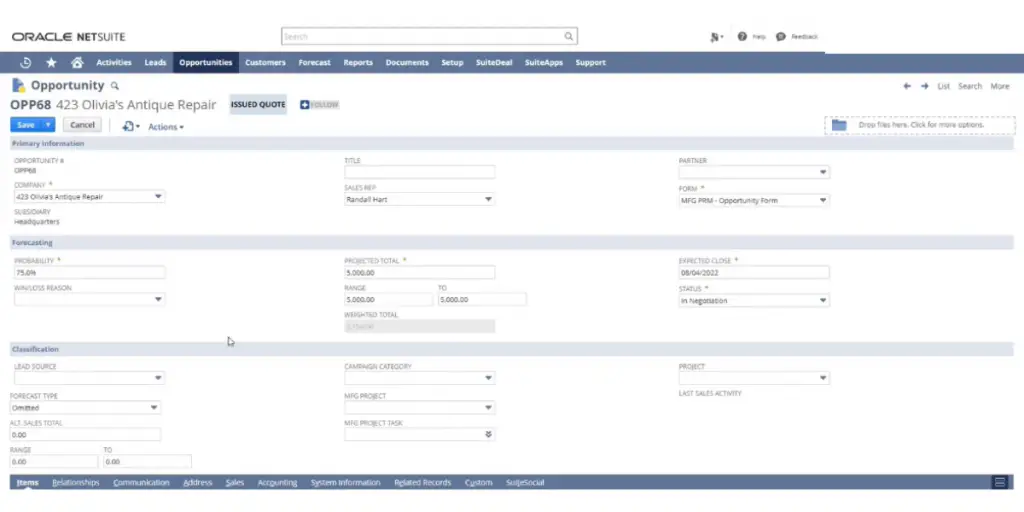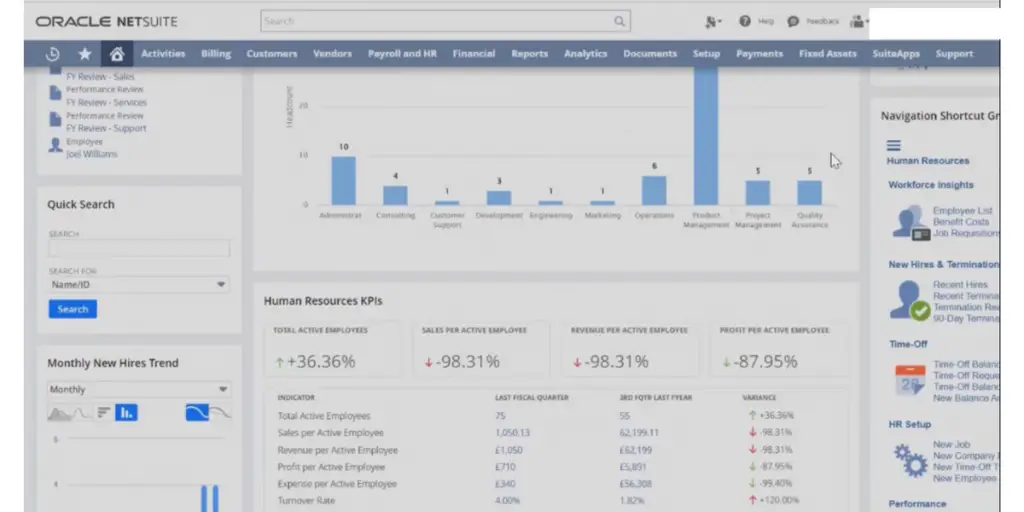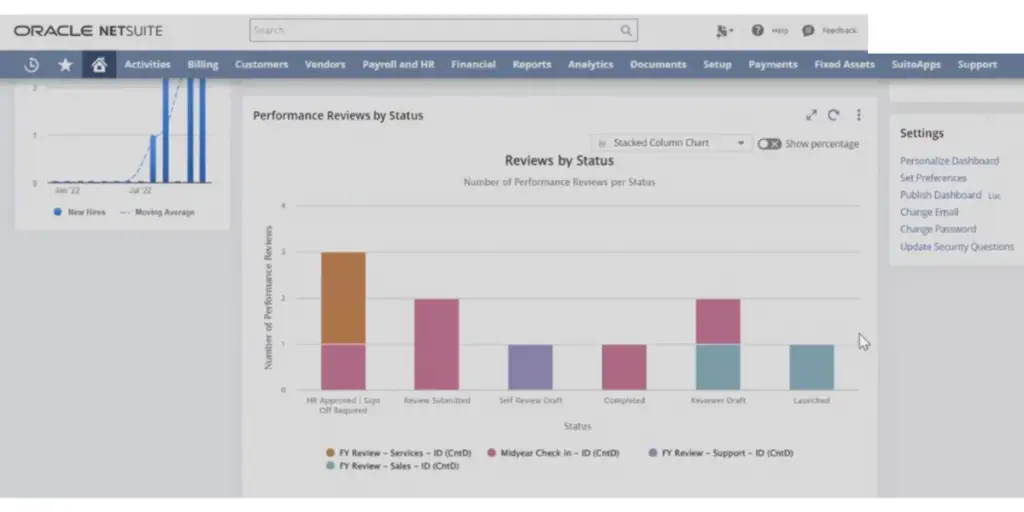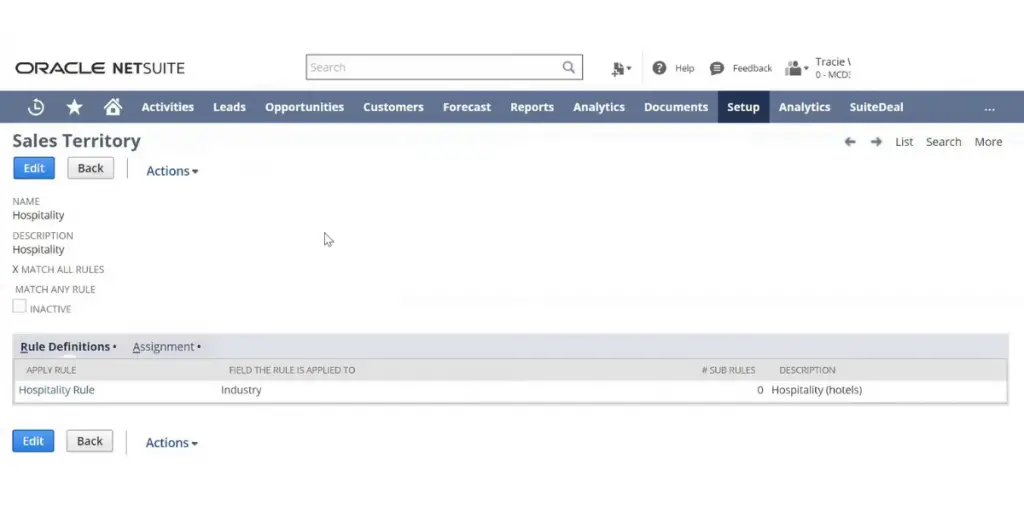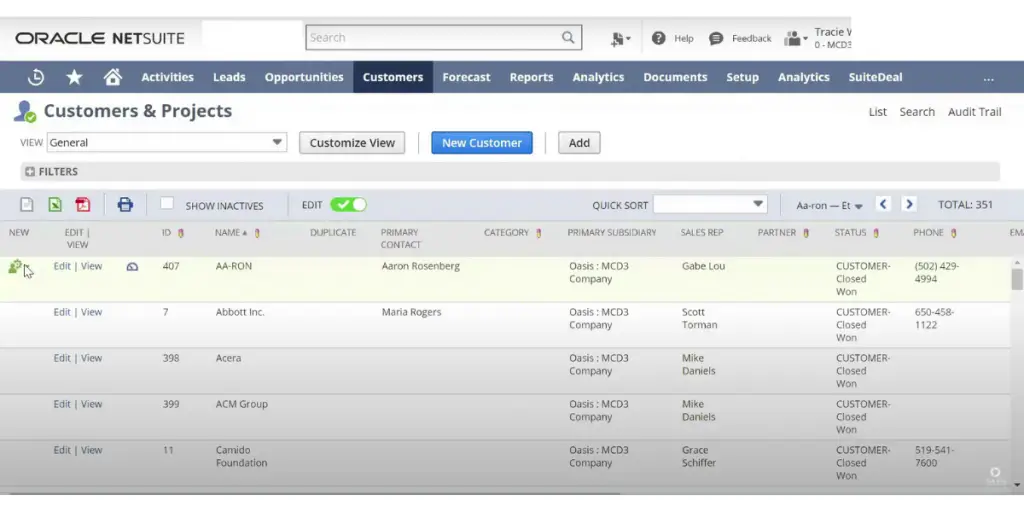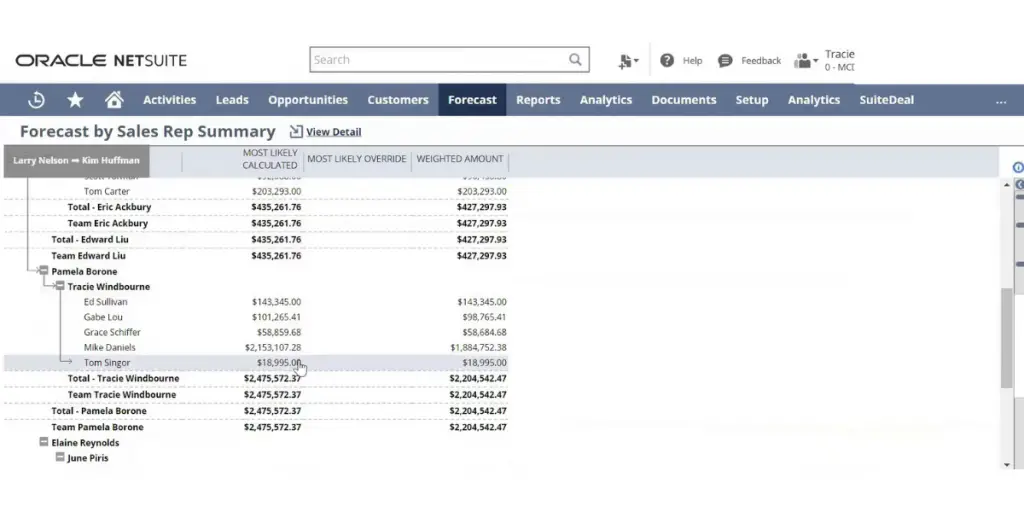Managing business operations efficiently can be challenging for companies of all sizes, particularly in industries that have traditionally been hard to manage. NetSuite ERP is one of them that helps to automate manufacturing processes and increase overall efficiency.
Whether you’re thinking about adopting NetSuite ERP for your business or just want to understand it better, this guide covers all the crucial points you need to know.
This article explores the key aspects of NetSuite ERP, including its main features, implementation, pricing, and pros and cons.
New version: NetSuite 2024.1
Related articles
What is NetSuite ERP?
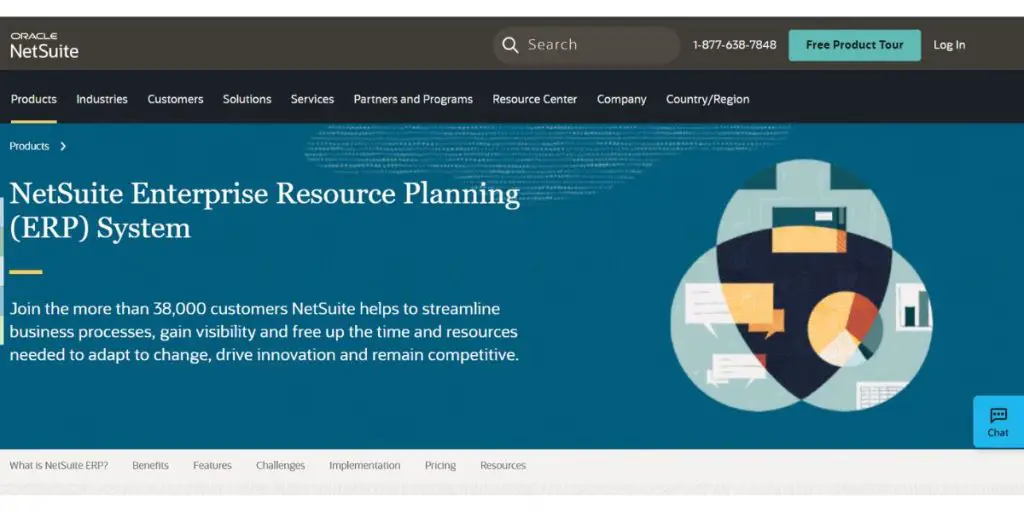
It is a revolutionary cloud enterprise resource planning (ERP) solution that helps your company achieve continuous technological improvements, streamline processes, and provide accurate reporting across the business.
By offering a unified suite of applications for accounting, order processing, inventory management, production, supply chain, and warehouse operations, NetSuite ERP enables companies to gain clear visibility into their data and maintain tighter control over their business activities.
NetSuite Pricing
(As of writing this article, pricing details are as follows. For more updates, visit its official website).
Its license cost starts at $999 per month, and the individual user cost is $99 per user per month.
The pricing structure is as follows
- Annual License Fee: Users subscribe to NetSuite with an annual license fee.
- Core Platform: The license includes access to the core platform.
- Optional Modules: Additional modules can be added as needed.
- Number of Users: The license fee varies based on the number of users.
- One-Time Implementation Fee: An initial setup fee is required.
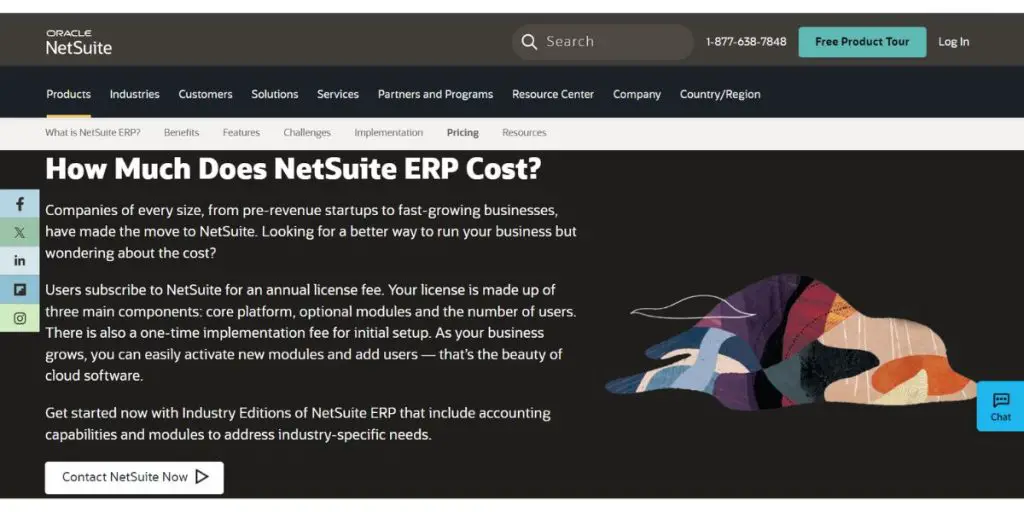
Pricing as per Edition
It offers three types of editions. They are categorized based on the number of users, the size of your organization, and the kind of functionalities you need.
| Limited Edition | This edition is a pricing plan for small industries with ten user licenses and less than 50 employees. |
| Mid-market Edition | This edition is a pricing plan for medium industries with more than ten user licenses and who are required to have merged financial reports across multiple currencies. |
| Enterprise Edition | It is a pricing plan for large industries with more than 1000 user licenses. |
Pricing as per the type of user
NetSuite price list differs per the end-user’s role, like a CEO, a sales manager, a controller, etc.
Pricing for advanced module
Apart from ERP and CRM features, NetSuite provides some add-on advanced modules. You can choose and get their license as per your business needs.
These are the modules dedicated to particular industries. For example, the NetSuite Manufacturing module is suitable for manufacturing industries. This module fulfills all the needs of the manufacturing organization.
But again, these advanced modules’ costs vary based on your industry type, like small, medium, or enterprise.
You can add or remove the modules per your requirement during the contract renewal.
Pricing for support
It provides technical support freely with the subscription license.
If you want 24/7 technical support, you need to upgrade to NetSuite premium support, depending on your software contract value.
NetSuite Implementation
The NetSuite implementation process takes place step by step.
- Introduction – The user finds its objectives and discusses the scope of implementation with its implementation partner.
- Setting up – The client sets up an internal team to help its NetSuite partner implement the software.
- Configuration – To find out all business scenarios, such as finance and CRM, during implementation, the internal team is involved in work sessions and learns how the scenario requirements are converted into NetSuite best practices.
- Data resetting – The software starts consuming customers’ data.
- Learning of software – The customer’s internal team observes and learns new enhancements and finds gaps in the process.
- Final configuration – The implementation partner executes the client’s customized design and transfers all data from the client’s legacy system to NetSuite.
- Testing and Training – End users start testing the new system for its ERP functionality, and all the users of the customer company take training on NetSuite.
- Live work and support – When the customer’s company starts running its business on NetSuite software. If any issues arise while running the software, the company gets help from the implementation partner, and thus implementation ends.
Supports and Services
It offers two types of support systems—basic and Premium.
Customers will get NetSuite essential support with its subscription, which includes
- Online support for complex issues during weekdays within working hours (8 am to 6 pm)
- NetSuite users support group access.
Premium support provides all facilities of essential support along with that it provides
- 24/7 supports
- Advanced notification of new releases
- Support on weekends
- Support via the toll-free technical center
NetSuite ERP Features
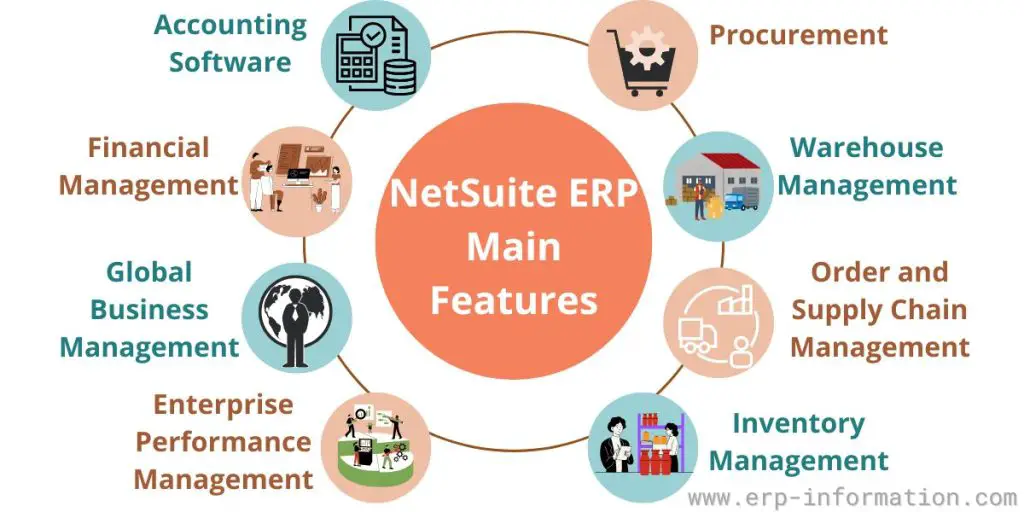
1. Accounting Software
Accounting software automates manual accounting tasks, provides real-time data access, and eliminates errors from duplicate entries. It ensures compliance by applying consistent rules for financial processes. The following are the features:
- Accounts Payable
- Accounts Receivable
- Cash Management
- General Ledger
- Tax Management
- Close Management
- Fixed Asset Management
- Payment Management
2. Financial Management
NetSuite’s Financial Management feature automates manual tasks, provides real-time data, and replaces spreadsheets to enhance accuracy. It ensures compliance with rules for revenue recognition, amortization, depreciation, and other financial processes. The following are the available features:
- Accounting
- Subscription Billing
- Planning and Budgeting
- Revenue Recognition
- Financial Consolidation
- Financial Reporting
- Governance, Risk, and Compliance
3. Global Business Management
Global Business Management ensures compliance with local tax regulations and multiple accounting standards worldwide. It handles currency fluctuations by posting real-time international transactions in local and standard currencies. It also accelerates the close process by automatically posting transactions at both subsidiary and headquarters levels, simplifying consolidations. The following are the features:
- Multi-currency
- Multi-language
- Indirect Tax Management
- Global Accounting and Consolidation
- Consolidated Financial Statement
- Audit and Compliance Reporting
- Electronic Payment
4. Enterprise Performance Management
Enterprise Performance Management streamlines budgeting and forecasting, automates account reconciliation for efficiency, accelerates financial close processes, and provides real-time dashboards for insightful data analysis and decision-making. Features are as follows:
- Planning and Budgeting
- Accounting Reconciliation
- Close Management and Consolidation
- Corporate Tax Reporting
- Narrative Reporting
- Profitability and Cost Management Reporting
5. Inventory Management
Inventory Management eliminates manual reporting, ensuring accurate, timely data. It optimizes inventory utilization across locations, minimizes stockouts and excess inventory, and reduces unnecessary handling to lower costs. Additionally, it provides full visibility for tracking products from supplier to customer. Features are as follows:
- Multi-location Fulfillment
- Replenishment
- Cycle Counting
- Item Visibility
- Traceability
6. Order Management
Order Management integrates orders with inventory to prevent stockouts, automates fulfillment to eliminate shipment errors, reduces shipping costs by routing orders based on inventory locations, and accurately manages returns, ensuring saleable items are swiftly reintegrated into inventory. The following are the features:
- Multichannel Order Management
- Sales Order Management
- Returns Management
- Pricing Management
7. Supply Chain Management
It maximizes product availability by accurately forecasting demand, considers lead times and preassemblies to prevent production delays, and ensures consistent quality through inspections of raw materials and regular production reviews. Features are:
- Supply Planning
- Supply Chain Execution
8. Warehouse Management
It offers real-time item visibility by bin location, reduces data input errors with mobile device order receipt, and optimizes warehouse space by strategically storing fast-moving products. It minimizes redundancy with wave release and multi-order picking and ensures accurate order picking with step-by-step mobile workflows. Features are:
- Inbound Logistics
- Order Fulfillment
- Mobile Warehouse Management
- Bin Management
- Cycle Counting
9. Procurement
NetSuite’s Procurement feature enhances vendor communication through a centralized portal, ensures compliance with regulations, controls spending with approval processes, and ensures accurate data capture with mobile scanners. It minimizes manual processes using existing contracts and blanket POs, and tracks supplier performance with workflows and vendor scorecards. Features are:
- Source Management
- Purchase Management
- Invoice Processing
- Vendor Management
You can integrate NetSuite ERP with NetSuite’s other products like CRM, HCM, PSA, Omnichannel Ecommerce, and Analytics and Reporting. We are providing those products’ features and screenshots here.
CRM
- Customer Service Management
- Marketing Automation
- Partner Relationship Management
- Sales Force Automation
- Configure, Price, and Quote
- Mobile
- Reporting and Analytics
HCM
- Payroll
- Performance Management
- Workforce Management
- Workforce engagement
- Workforce planning
- Analytics
Professional Service Automation
- Analytics
- Expense Management
- Project Accounting
- Project Management
- Resource Management
- Timesheet Management
Omnichannel Commerce
- B2C and B2B E-commerce
- Order Management
- Point of Sale
- Connectors
- Inventory management
- CRM
Analytics and Reporting
- Reporting and Dashboards
- Data Warehouse
Advantages
Following are a few advantages of this ERP.
Easily customizable
It provides basic features as per your subscription. But you can customize these features as per your business needs quickly.
The NetSuite platform allows you to customize forms, fields, and documents. You can also change and generate new functionalities, workflows, and business processes per your/user’s requirements.
Provides visibility
With the help of its feature, you can get a perfect customer view and track the customer quickly.
It allows you to record and analyze the contracts to the purchase history and provides real-time data to make better decisions.
Very flexible
It is very flexible software. You can effortlessly integrate it with any third-party software without losing precision and accuracy.
Limitations
Every ERP has its limits. You know NetSuite is a good cloud ERP. Still, it has some drawbacks. Let us have a look.
More support and maintenance for customization
Customizing this ERP requires more attention and support because it is very advanced.
Expensive
It is costly for small businesses.
Extra maintenance cost
It provides an annual subscription plan for users and the number of accounts required. You have to pay more ERP maintenance costs when users and accounts rise.
Extra costs for advanced modules and suite apps
If you need more advanced functionalities to enhance your business, you can go for advanced modules and suite apps. But you need to pay an extra fee for that.
What industries does it support?
It supports the following industries:
- Digital Marketing
- Advertising
- Apparel, footwear, and accessories
- Camus stores
- Education
- Consulting
- Energy
- Healthcare, health, and beauty
- Manufacturing
- Media and publishing
- Financial services
- Food & beverage
- Retail and wholesale distribution
- Professional services
- Nonprofit
- Restaurant & Hospitality
- Transportation
- Software companies
- IT Services
NetSuite Alternatives
- Sage Intacct
- Quickbooks Desktop Pro
- Acumatica
- SAP Business One
- Epicor ERP
- FinancialForce
- Microsoft Dynamics GP
- Sage 100cloud
- Odoo ERP
Customers
- ASICS Asia
- Covisint
- DWA Media
- Primary arms LLC
- Zev Technologies
- 7 Nation
- Channel Advisor
- School of Rock
FAQs
What is NetSuite for Accounting?
NetSuite Accounting allows the different sizes of companies which are having global businesses. This can handle different currencies, tax laws, and different languages.
Conclusion
Although NetSuite may have some drawbacks, it remains a popular cloud ERP for a good reason. It is flexible, easily customizable, and provides visibility into customer data.
Additionally, it integrates well with other software programs, making it an attractive option for businesses of all sizes.
References:
